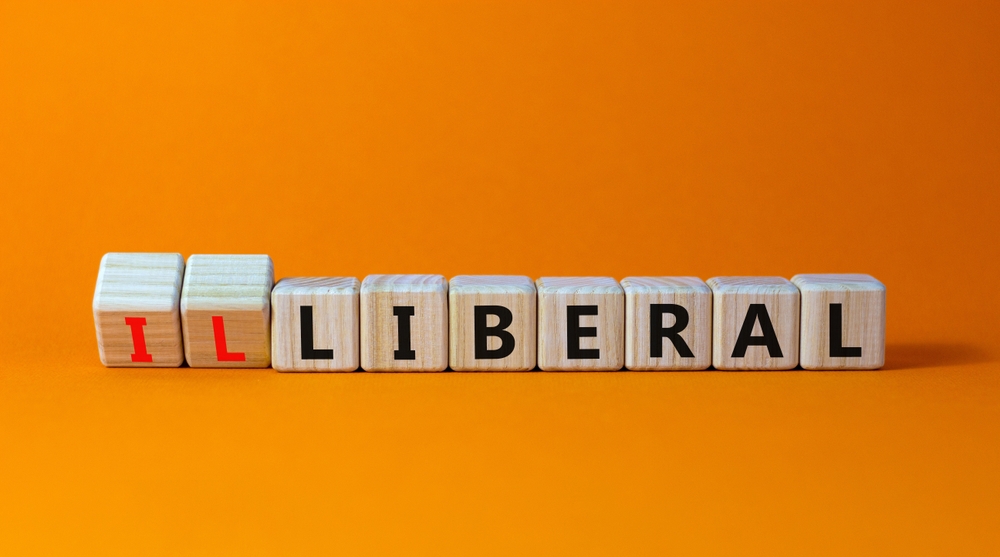“When the enemy is Hitler,” F.H. Buckley writes, “and the world is divided between Schmittian friends and enemies, everything is permitted.”
Such divisive contemporary issues as Black Lives Matter, the Israel-Palestine war, and trans rights leave little room for compromise and much for demonization. Politics takes on a totalizing quality in such an environment, in which not only do trivial matters embrace a life-and-death tone but areas seemingly far afield from contentious debate—late-night comedy, award shows, advertising, sports—become ideological battlegrounds as well. As recent attempts on Donald Trump’s life following years of comparisons of him with Adolf Hitler demonstrate, people may allow themselves to partake in extremist actions when they believe they fight extremists. The Schmittian “friends and enemies” dichotomy that Buckley addresses justifies much unjustifiable behavior, which makes it so loathsome. Combatting this Manicheanism animates The Roots of Liberalism: What Faithful Knights and the Little Match Girl Taught Us about Civic Virtue.
In contrast to the progressivism in ascendency for more than a decade, Buckley celebrates a liberalism of empathy, benevolence, and kindness. “Today we wouldn’t say we need kindness,” he explains. “Justice has taken its place. But if kindness made us more liberal its abandonment has made us illiberal. As justice is defined today, it’s encouraged the woke left to abandon free-speech principles and turn commonplace conservative ideas into thought crimes. Kindness itself is made a vice, if it offers forgiveness to the enemy.”
In other words, injustice masquerades as justice, whose frequent demands include a modifier—“climate,” “economic,” “social,” etc.—which often signals dishonest language immediately ahead. Buckley thrives in outlining the illiberalism of this “woke” left. He displays a learned background in plucking the right vignette from philosophy, history, literature, and even sports and popular culture to illustrate a point. He writes well, and does so with passion. Hell hath no fury like a liberal scorned. Buckley, of course, regards himself as the true liberal and those sometimes grouped under the label’s latest iteration or offshoot as imposters. So maybe he mainly scorns the imposters rather than the reverse.
What does a true liberal believe? In Europe, when liberalism’s core tenet of individual rights fell to the greatest good for the greatest number, adherents of the old creed eventually found it necessary to prefix “liberal” with “classical.” In the United States, the New Deal attached liberalism to a centralized, bigger government, disassociated the word from freedom, and helped catalyze what became the postwar conservative movement.
Does F.H. Buckley regard himself as a pre–Jeremy Bentham/J.S. Mill European liberal or maybe a pre-FDR American liberal?
No. In fact, he cites Roosevelt as embodying characteristics one desires in an ideal president. Policy-wise, he says liberals believe America to be a creedal nation that welcomes new waves of immigrants (“we’ve always been replaced, and we’re none the worse for it”) and allows that liberals can “disagree about abortion, but they’ll nevertheless think that the government should stay out of bedrooms and will not want to see Griswold and Lawrence reversed.”
So, from what philosophical wellspring does one come to these positions of policy and law?
Buckley claims, perhaps accurately, that liberalism grows out of “emotions” and not reason. “One thing that is central to liberalism is a feeling of benevolence,” he insists, “an altruistic desire to look beyond self-interest and take the interests of others into account.” In this telling, liberalism becomes the “feelings, nothing more than feelings” of political philosophies. Morris Albert’s 1975 hit song seems an odd foundation for a political philosophy.
Indeed, this altruistic desire manifests itself in an, for lack of a better term, alienism in which liberals demonstrate their goodness by reflexively embracing the exotic over the familiar, the distant over the close, and the stranger over a neighbor. Recent examples of this phenomenon of exaggerated—and showy—benevolence include “Queers for Palestine,” Sanctuary Cities clutching to that title after an influx of illegal immigrants made a mockery of it by unleashing crime and depleting social services, and Diversity, Equity, Inclusion (DEI) instilling a simplistic good-guys-vs.-bad-guys narrative upon the Rest and the West. Progressives perversely long to show to those inside their clique that they defend those outside their group. It amounts to a reversal of Edmund Burke’s concept of “little platoons.”
The Roots of Liberalism fails to consider how the author’s amorphously described liberalism of emotions, altruism, and benevolence became the alienist liberalism so much of the book derides. Put another way, both the inability to define it and its emphasis putting the interests of outsiders ahead of oneself inevitably hurled the liberalism Buckley embraces toward its current state—which he rejects. If one cannot say what one believes, then another will. And if conditioned displays of championing the outsider pass for a political philosophy, then true believers undoubtedly try to outdo one another in a race for purity. Clearly, we arrived at this point through those roads.
Buckley does not address a serious definition until the final chapter, and then punts. “We’ve examined the roots of liberalism without bothering to define it,” he admits. “I did not try to describe its essence and still less to offer a one-sentence definition for all the things it might mean.” This seems a fatal admission; coming as it does with a few pages remaining, it leaves the reader feeling very Geraldo-Rivera-opening-Al-Capone’s-vault empty. He considers the possibility that liberalism “doesn’t rise to the level of a concrete idea.” Yet he wrote an entire book trying to revive this thing he cannot define and urges “conservatives to pick up the mantle of non-ideological liberalism” (whatever that may mean). Hmmm.
Elsewhere, Buckley embraces heterodox, and quite interesting, positions that he quickly abandons to fend for themselves. He offers surface criticism of the champions of natural law without leaving any deeper explanation of his position. “Why conservatives think Tocqueville liked America,” he writes, “is a mystery to me.” He rejects the idea that a Madisonian Constitution emerged from Philadelphia, at least citing here a note from James Madison conceding defeat.
Conservatives, he explains, “fail to recognize how the separation of powers has failed to cabin corruption, and how parliamentary countries that lack a separation of powers rank higher than we do on measures of both civic virtue and freedom.” What evidence does the Canadian offer for his preference for the parliamentary system with which he grew up? “When I compared the fifty-odd parliamentary regimes to the ninety-odd presidential ones in a regression analysis, I found that the former were significantly freer.” Why not show the evidence buttressing this position? Here Buckley offers assertions that do not amount to unsupportable ones yet do not find much support within this book. Probably writing about parliamentary vs. presidential systems exhaustively in past work motivated him merely to touch on it here. Just because he addressed this elsewhere does not mean that readers, who need evidence when stumbling upon broad assertions that challenge them, have encountered it.
Buckley depicts American literature as validating his political ethos. “Not merely are American stories liberal in the sense that they’re rooted in the moral sense of a liberal people, but by nature they incline us to liberalism,” he writes. “They awaken our sense of empathy for suffering people left behind, and they ask us to understand ourselves more closely. We become less ready to judge unfairly, lest we ourselves be judged.”
The last line describes much good literature. The titles that most easily lend themselves to Buckley’s more sweeping claim—Uncle Tom’s Cabin, Looking Backward, The Jungle—do so because they sacrifice literature to convey a political message. Of course, American writers marinate in our civilization and our civilization propelled many liberal values, particularly of the kind for which Buckley expresses an affinity. Still, what do such works central to the American literary tradition as the novel Moby-Dick, the story “A Good Man Is Hard to Find,” and the play Long Day’s Journey into Night have to do with liberalism? If preachers can find all sorts of conflicting messages from the same Bible passages, maybe asking such a question makes for a fool’s errand.
One decidedly illiberal value, best illustrated through the art-for-art’s-sake vs. art-as-a-weapon debates within the Communist Party, involves not only reading one’s politics into works but judging them not on aesthetic grounds but political ones. Buckley undoubtedly rejects measuring literature in such a manner. But, again, one grasps how the mild intrusion of politics into literature, of the kind the author exhibits, led to the illiberal one embraced by others on the left branching out from such liberalism.
The Roots of Liberalism leaves the reader confused about what liberalism means, which leaves its roots undisturbed and so unobserved. The author otherwise offers a pleasingly presented buffet of what created the West and what undoes it. Not an unworthy book, The Roots of Liberalism just seems like one mismatched with its title.

